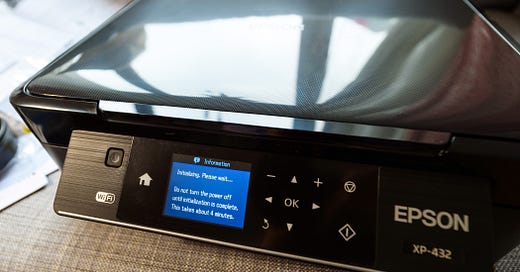
The Week in Repair: June 5 - 11
A 25 year smart phone? Kyle Wiens of iFixit on repairs remaining obstacles. Also: New York’s Fair Repair Act is a watershed. Here’s why. And: FTC takes aim at hi-tech trusts.
The Digital Fair Repair Act: Watershed Moment in Fight to Repair
Fight to Repair – Opponents of a Right to Repair had a 99% success rate defeating right to repair laws. Then came New York. With the backing of NYPIRG, the state chapter of the Public Interest Research Group and the Repair Coalition, working with sponsors NY Assembly member Patricia Fahy and State Senator Neil Breslin’s shepherded the Fair Repair Act through committees and to the floors of the Assembly and Senate for a vote.
Earth.org – New York could potentially pave the way for other states to follow over the next few years, reducing the country’s overall electronic waste. But some critics have pointed out the language of the bill excludes public safety communications and agricultural equipment, as well as “home appliances with digital electronics embedded within them”. Considering the growing trend of “smart” fridges, washing machines and home appliances, there is a significant loophole to the bill, which could fail to eliminate a large number of electronic products and devices.
iFixit – On June 1, the New York State Senate passed their version of the Fair Repair bill 49–14. Today, led by Rep. Pat Fahy, the Assembly passed theirs 145–1. For independent repair shops, this news is huge: Independent shops will finally be able to compete with manufacturers, resisting the repair market consolidation manufacturers have created by restricting access to parts and tools. In a recent California survey, 59% of independent repair shops said they might have to close their doors without the passage of Right to Repair.
The same phone for 25 years? iFixit on repair’s remaining obstacles.
Kyle Wiens of iFixit spoke at Ars Technica’s Ars Frontiers event about the progress …and road ahead for the right to repair movement.
”The repair economy, the circular economy around iPhones, is significant. ... It creates a lot of jobs," Wiens said. "Apple could easily short-circuit that economy by employing these cryptographic locks to tie parts to phones. Then this would tie into Section 1201 because it might potentially be illegal to circumvent those locks to make an aftermarket part work again."
Wiens envisioned a world where gadgets not only last longer but where you may also build relationships with local businesses to keep your products functioning. He lamented the loss of businesses like local camera and TV repair shops extinguished by vendors no longer supplying parts and tools.
"I think it's incumbent on all of us to say, what kind of economy do we want? Do we want a main street where we have local people that know how to fix and maintain our things? Or do we want a factory assembly line where we manufacture stuff in Asia, we dump it here, use it for however long it works, and then there's no maintenance plan for it," Wiens said. "I think we should be talking about lifespans of smartphones in terms of 20, 25 years," Wiens said.

FTC Chair says Right to Repair a Top Priority
Save Money on Auto Repair Transportation (SMART) Act co-sponsor Rep. David Joyce (R-OH) highlighted rising car repair costs for American families due to repair restrictions.
“I’d like to focus a minute on repair restrictions, specifically those restrictions that drive up the cost of auto repair…[w]ith record inflation, it is set to cost American families an extra $5,200 this year,” Joyce said. “Considering that a repair for a simple fender bender average nearly $4,000 today, a 26.4% increase in just five years, what more do you believe can be done with respect to automobile repair restrictions – whether on patent abuse or data controls – to bring down the cost of auto repairs for American consumers?”
Federal Trade Commission (FTC) Chair Lina Khan responded that rooting out illegal repair restrictions “is a top priority for the commission,” especially as “the growing digitization just gives additional tools and levers for…auto manufacturers to be manipulating what types of repairs can and cannot occur.”
Echoing the FTC’s 2021 Nixing the Fix report, Chairwoman Khan also noted that modern repairs “often require specialized tools, difficult-to-obtain parts, and access to proprietary diagnostic software.” Repair restrictions limiting access to this information, she argued, “have made consumer products more difficult to fix and maintain.” (Tire Review)
When DRM comes for your Wheelchair
Any product that travels with you is likely to break, eventually. A product that is designed solely for indoor usage but gets used outdoors is even more at risk. But for powered wheelchair users, this situation is gravely worsened by an interlocking set of policies regarding repair and reimbursement that mean that when their chairs are broken, it can take months to get them repaired.
This has serious consequences. Wheelchairs are powerful tools that enable mobility and freedom; But broken wheelchairs can strand people at home—or even in bed, at risk of bedsores and other complications from immobilization—away from family, friends, school and work. Broken wheelchairs can also be dangerous for their users, leading to serious injuries.
Stranded is a new report from the Public Interest Research Group (PIRG), based on interviews with 141 wheelchair users about their experiences with mechanical and electrical failures in their powered chairs.
The report documents the dismally frequent incidents of wheelchair failures (93% of respondents needed wheelchair service in the previous year, 68% needed two or more repairs), and the long service delays that wheelchair users must endure (62% waited four or more weeks for each repair; 40% waited seven or more weeks). (eff.org)
EU finalizes Charging Port Standardization Rules
The European Union has reached a provisional agreement on rules to enforce common charging solutions for a large variety of devices. A total of 15 types of devices will be covered in the new rules, including smartphones, laptops, tablets and other small and medium sized electronics.
All these devices will have to implement a standard charging port, and USB Type-C being the most efficient and widely implemented option, is expected to take over all these devices. That means, the world might finally get to see an iPhone with a USB type-C port on its bottom panel. But that’s not it, the rules will also be enforcing wireless charging interoperability, making it compulsory for all companies making wireless chargers to make their product compatible with all devices, irrespective of the brand on the back. (thetechportal.com)
Local repair shops, facing existential threat, help advance Right to Repair
The legislative and legal battle over who can fix modern gadgets pits manufacturing Goliaths against a plucky army of Davids, including a loose regiment of local independent repair shops.
Shop owners have been mobilizing their customers and calling on their fellow shop owners to help overcome manufacturer opposition and enact reforms -- and it’s working. Repair voices including Louis Rossman (repair shop owner and YouTube host), as well as Repair.org, were critical to the recent victory in New York, where the legislature passed the nation’s first Right to Repair bill for electronics. (uspirg.org)
Auto Shops push for Ruling in 'Right to Repair' Lawsuit
More than 18 months after Massachusetts voters soundly approved an update to the state's 'right to repair' law, the changes have yet to go into effect.
That's because a lawsuit filed by automakers to block the law has been grinding on in a U.S. District Court in Boston amid a mountain of legal filings and several delays in a ruling in the case, which seeks to undo the voter-approved changes.
In a new legal brief, lawyers representing the Massachusetts Right to Repair Coalition call for a "prompt decision" in the case and accuse automakers of using "delay tactics in order to avoid and prevent the implementation of right to repair laws."
"Undoubtedly, delays are an inevitable part of litigation," they wrote. "But delay has also been an integral part of auto manufacturers’ strategy in frustrating the ongoing efforts of consumers and independent repair shops to obtain fair and equitable access to diagnostic data needed to maintain and repair vehicles." (gloucestertimes.com)
Why Powered Wheelchair Users Are Fighting For The Right To Repair Their Own Equipment
The U.S. is making progress away from the limitations of proprietary repair services and towards fairer laws that not only make third-party repair easier but also acceptable. Adding to this progress, the state of New York recently passed the "Fair Repair Act" bill that compels all "digital electronic products" manufacturers to uphold the right to repair and make spares available so people can fix their gadgets themselves. In line with the right to repair consumer electronics, another movement for fairer repair regulations is starting to shape up, and it concerns mobility vehicles such as powered wheelchairs for the disabled. (slashgear.com)
More than a Third of UK Adults Plan to increase Household Repairs
Millions of households are turning to repairs and renovations, rather than replacements, a new study by insurance business Aviva suggests. Earlier this year, Aviva’s latest How We Live Report suggested nine out of 10 UK adults (88%) attempt to fix selected household items when damage occurs. A further Aviva survey of 2,000 UK adults now suggests more than a third (36%) of people expect to repair more possessions in the coming months.
A similar number (35%) intend to upcycle more, while 33% believe they will be buying more pre-owned items. Others plan to use barter systems (12%) or pick up free items from giveaway sites and social groups (24%). (circularonline.co.uk)
Why your ability to repair a tractor could also be a matter of life and death
The right to repair isn’t only about consumer electronics or even farmers’ rights, as we discovered during the early, panic-stricken months of the pandemic. Then, hospitals urgently needed to repair or service critical medical equipment, but found that sometimes manufacturers wouldn’t provide proprietary repair manuals or supply replacement parts. In March 2020, for example, an Italian hospital was unable to obtain valves for its ventilators from their manufacturer. Volunteers designed and 3D-printed 100 replacements at a cost of a dollar each. In normal times, those engineers might well have been prosecuted by the manufacturer for infringing its intellectual property rights. So sometimes the right to repair isn’t just a geeky obsession but a matter of life or death. (The Guardian)
Other Repair News...
Deere faces 13th lawsuit (Progressive Farmer)
Consumer savings, convenience sought in digital repair bill (newburyportnews.com)
Global Refurbished Smartphone Market Analysis & Forecasts, 2016-2021 & 2021-2024 (globenewswire.com)











